After citizens across Thailand have remained vigilant in preventing the spread of the COVID-19 virus in the country for nearly three months under the announcement of the emergency decree or the lockdown, thanks to the cooperation of the general public, there has been no new cases in the country for a continuous period of time while other major countries still saw the number of new cases rising. Therefore, the Thai government has started to relax the lockdown measures in the fourth stage and allowed citizens to carry out economic activities as well as everyday activities under the new normal way of life.
This efficient manner in dealing with the COVID-19 crisis has earned Thailand recognition for its “public healthcare system” as the Centre for Covid-19 Situation Administration (CCSA) revealed that other countries have expressed admiration for Thailand. For example, President Donald Trump has ranked Thailand as one of the top ten countries with the highest quality of healthcare services, while Mr. Jeremy Hunt, the former Health Secretary of the UK has complimented Thailand for its management and measures to deal with the emergency situation. Moreover, the World Health Organization (WHO) has praised Thailand for its Village Health Volunteers (VHVs).
Though a vaccine and a cure for the COVID-19 virus is yet to be found, it can be said that Thailand can declare victory for the first wave of the spread of the virus as the country has successfully overcome this crisis due to the cooperation of the people who followed government measures which included staying home and strictly practicing social distancing. Meanwhile, another group of people who had a key role in combating the crisis is the “medical personnel” – the frontline who has treated patients until the number of cases has steadily decreased.
However, part of the reason behind this success is due to the cooperation of the “volunteer army” from the public sector – private sector – people who worked together to prevent the spread of the virus and developed innovations to decrease the risk of medical personnel contracting the COVID-19 virus while on duty. Moreover, these volunteers had urgently distributed the COVID-19 virus prevention equipment to hospitals where large numbers of patients came in for treatment, including hospitals in remote areas.
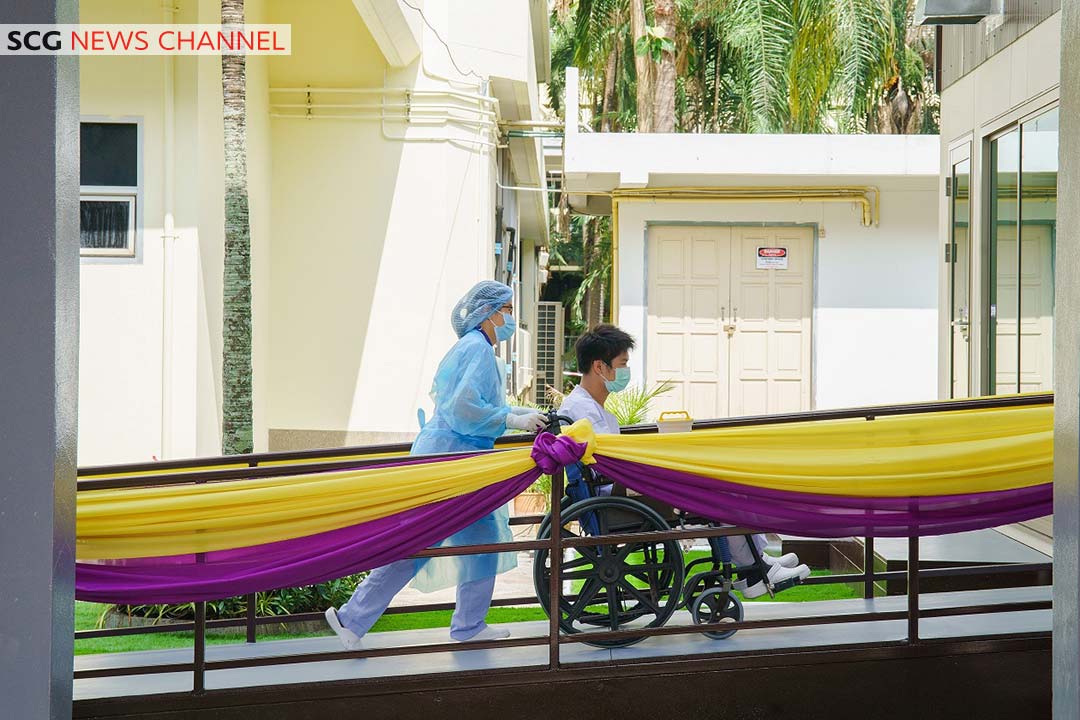
His Majesty the King and Her Majesty the Queen Shows Concern for the People Donating “Modular Swab Units” to Prevent Against the Spread of the COVID–19 Virus to 20 Hospitals Nationwide
With great concern for the people across Thailand who faced this deadly disease, His Majesty the King and Her Majesty the Queen have donated “Modular Swab Units” developed by SCG which are a part of the “Royal Project to Provide Ventilators and Medical Equipment” to combat against the COVID-19 virus to 20 hospitals nationwide to ensure the readiness of hospitals in the case of repeated spread of the COVID-19 virus in the future. This initiative brought joy and encouragement to doctors and all Thai citizens who have been fighting against the COVID-19 crisis. Moreover, the general public felt deep gratitude for the kindness of their majesties.
Mr. Worapan Suwannut, Sa Kaeo Provincial Governor said, “Sa Kaeo Crown Prince Hospital treated many patients with COVID-19 symptoms from both within the provincial capital as well as Aranyaprathet district. As the hospital is located near the border, it welcomed a large number of people who were traveling in and out of the country, including Thai and Cambodian workers. Therefore, the modular swab unit that was donated allowed us to identify patients at a faster rate and helped us stay more vigilant.”
Meanwhile, Assoc. Prof. Roengsak Leetanaporn, M.D., Vice Dean for Hospital Affairs and Hospital Director of Songklanagarind Hospital said, “The hospital had prepared to diagnose and treat COVID-19 patients from 14 southern provinces, especially critical patients from the three provinces on the south border which are Narathiwat, Pattani, and Yala. We have treated all patients to the best of our ability and all of our patients have survived. The hospital had prepared by raising awareness about the infectious disease, preparing the necessary equipment and workspace, as well as run practice drills to create confidence among our staff and raise the team spirit to prepare them to make sacrifices in taking care of the general public. We are deeply grateful for the kindness of their majesties for the donation of the modular swab unit.”
Suchart Porncharoenpong, M.D., Director of Buddhachinaraj Phitsanulok Hospital said that the hospital is the central hospital in the lower northern region and upper central region and is responsible for the health of over 3.5 million people including COVID-19 patients in cases when other hospitals in the area are unable to treat these patients. Therefore, the modular swab units can help ease the worry of the people regarding the spread of the virus.
“When the people in Phitsanulok province learned that their majesties have donated the swab units as well as other medical equipment, they were ecstatic and grateful for this act of kindness. We will use this donated equipment to carry out treatment to ensure the best public healthcare services for the people.”
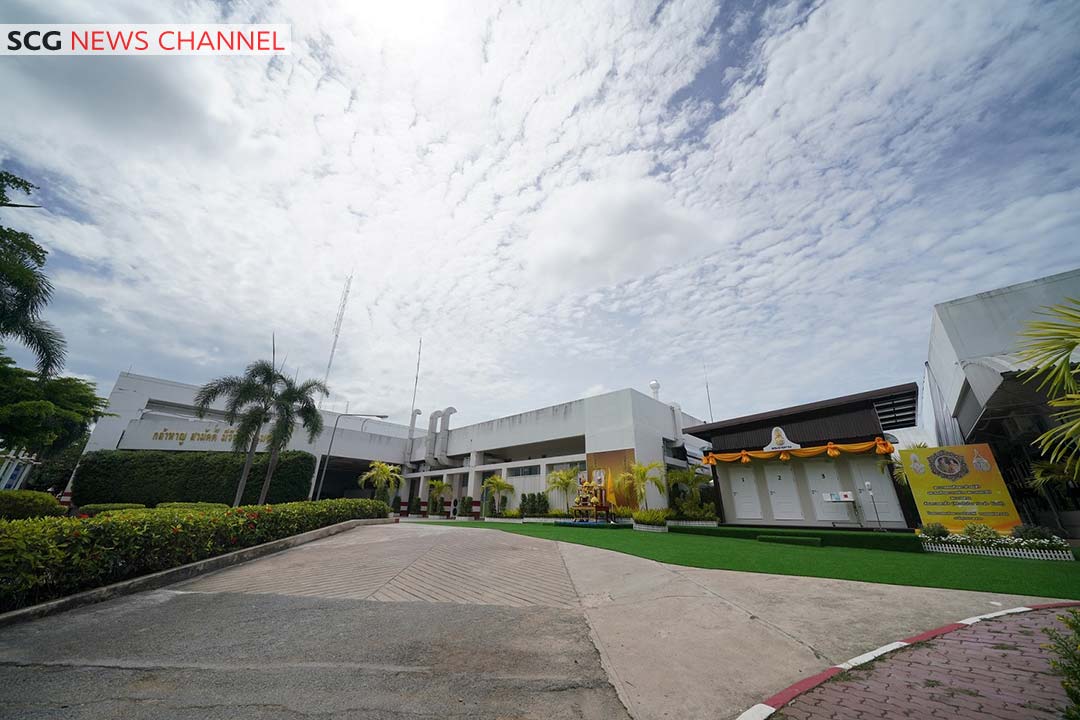
Addressing Citizens’ Troubles with the Kindness of Their Majesties In the Time of the Spread of the Deadly Disease
The COVID-19 virus is a new disease that is responsible for the death of a large number of people, which caused concern for both medical personnel and the general public as the healthcare system was not fully prepared to handle the crisis during the first few weeks and it was difficult for doctors to diagnose and treat patients.
LCdr. Naruemol Kaigate, Chief of Infection Control Department at Somdej Phranangchaosirikit Hospital also talked about the difficult period before the hospital received the modular swab units. “During the initial period, doctors and nurses would wear a high-level safety suit to take samples from patients in the negative pressure room situated in the emergency unit. However, as the number of patients grew, we had to use the isolation room at the female patient’s quarter, which was not a negative pressure room. Therefore, the medical personnel required a large number of high-level protective gear which was difficult to procure at that time, and so the protective gear had to be reused.”
Meanwhile, Dr. Somporn Jedsadayanmetha, Deputy Director for Nursing at Buddhachinaraj Phitsanulok Hospital expressed concerned about the spread of the disease among patients and revealed that, “The hospital would take samples from patients in a small corner of the hospital which meant that a large number of patients would need to wait in close quarters, raising the concern that general patients and infected patients would come into contact with each other.”
Wing Commander Surinnat Charoenjit, Surgeon at Bhumibol Adulyadej Hospital, Royal Thai Air Force added that, “Although we had aerosol boxes to prevent the spread of the COVID-19 virus, the process to take samples from patients was still a struggle as doctors were at risk of contracting the disease. The modular swab unit that was donated helped facilitate doctors and enabled them to carry out swabs safely without the need to wear Personal Protective Equipment (PPE) which were both thick and hot on the inside while performing swabs under the sun and in hot and humid weather. Moreover, we were able to serve a larger number of patients as the screenings could be carried out at a faster pace.”
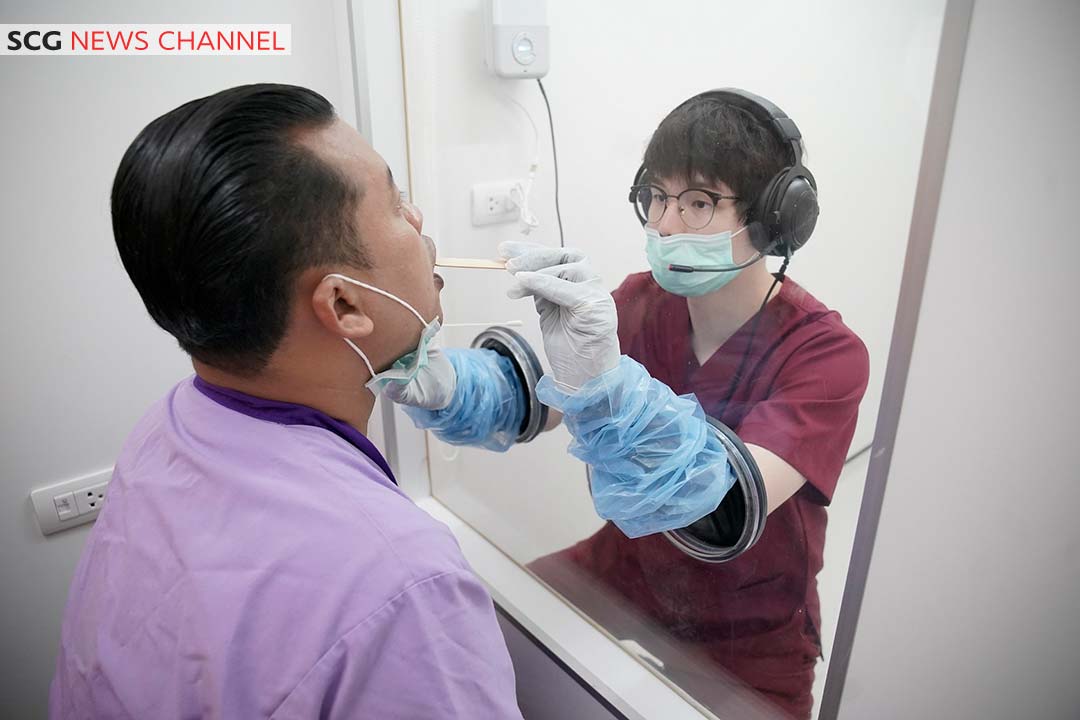
Putting Doctors and Nurses at Ease with the “Modular Swab Units” Developed by SCG Boosting the Morals of Medical Personnel
The “modular swab unit” was developed with technology from SCG Heim and SCG Living Solution which featured a system that can control air pressure and airflow as well as ensure that the air in the system is clean and safe, preventing leaks and exchanges between the air inside and outside of the building. The system offered more safety to doctors on duty as the medical team is stationed in a room that is free from contaminated air from outside, thus, the air within the unit is clean and safe. Meanwhile, patients at risk are in an aerosol-free room. The modular swab unit is also disinfected using concentrated UV germicide after every use in order to ensure that it is virus-free.
Piamlarp Sangsayun, M.D., Medical Physician, Expert Level, Head of Chest Department at the Central Chest Institute of Thailand, Department of Medical Services admitted that treating COVID-19 patients can cause stress for medical personnel as doctors have a limited knowledge about this new disease.
“The donated modular swab unit eased our worries as they can help decrease the risk of medical personnel contracting the disease thanks to the system that controls the air pressure. Patients also feel more confident as they benefit from this system”
Meanwhile, Mrs. Chaweewan Thankla, Head of Patient Out Department, Buddhachinaraj Phitsanulok Hospital, said, “Patients who were sitting in the area all watched as the unit was installed. The installation processed was carried out swiftly: the unit can be set up into a room and it can immediately be used. It’s unbelievable how the modular swab unit can be put together in just 2-3 days and become fully functional right here.”
Their Majesty’s Long–Term Vision in Donating the “Modular Swab Unit” Helps Prevent Against the COVID–19 Virus, Ensuring Readiness for the Second Wave of the Disease A New Dimension for the Medical Industry as the Modular Swab Units Can Be Adapted to Diagnose Other Diseases
The donation of the modular swab units not only eased the problem during the crisis, but it also provided a tool that ensured the readiness of hospitals in case of the second wave of the disease. Therefore, the Thai public healthcare system will be ready to combat the COVID-19 virus in the long term.
Aryoot Pamarapa, M.D., Director of Uttaradit Hospital, the main hospital in the lower northern region which handled patients from Lao People’s Democratic Republic had approximately 2,300 outpatients per day and 700 inpatients per day, revealed that the modular swab unit helped to control the spread of the disease as well as prevented against the second wave.
“The modular swab unit is highly useful in cases of the second wave of the disease in the future. It can also prevent the spread of other contagious disease. Most importantly, as our hospital is a teaching hospital, we were able to use this crisis as a learning opportunity about new diseases for doctors and medical students at the hospital.”
Meanwhile, Mrs.Auayporn Chongsakul, Deputy Director of the Nursing Department at Paholpolpayuhasena Hospital said, “The donated modular swab unit ensured the safety of both medical personnel and patients. Once the spread of the COVID-19 virus comes to an end, the swab unit can be used to diagnose tuberculosis, as Kanchanaburi is the province with the highest number of tuberculosis cases in the country.”
Moreover, Nikom Malitong, M.D., Deputy Medical Director at Ratchaburi Hospital said, “There are other diseases apart from COVID-19 that can spread through the respiratory system. Therefore, the new normal way of treating patients will need to take into consideration the preparation for cleanrooms in hospitals to prevent medical personnel from contracting the disease as well as to prevent patients from spread the disease to others.”
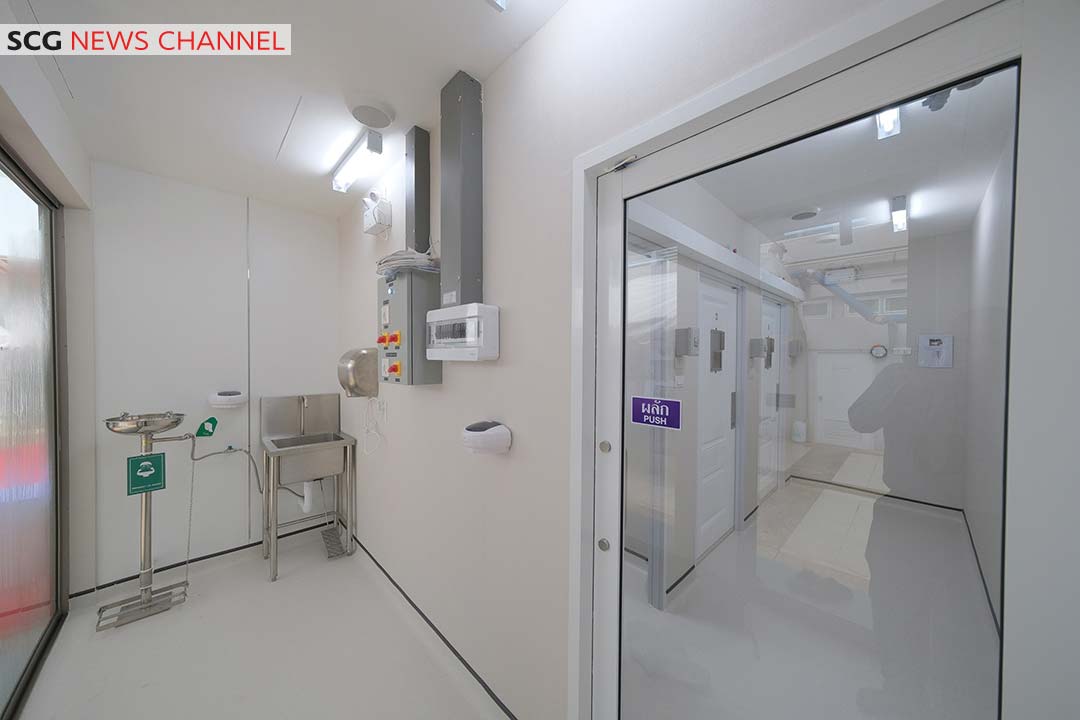
All Thai People Appreciate the Great Kindness of Their Majesties Expressing Gratefulness for Their Benevolence
Despite the concern of the people regarding the spread of the COVID-19 virus, once they heard about the kindness of their majesties in donating the modular swab units to protect and care for their subjects, the general public felt at ease and were encouraged to continue the fight against the disease together with the team of doctors and nurses.
Miss Chanchira Kobanthat, a citizen of Songkhla province said, “As a citizen in Songkhla province, I would like to express gratitude for the donation of the modular swab units for medical personnel and patients that had been made by their majesties, and I would like to thank their majesties for giving these equipment to the people of Songkhla. Long live their majesties. Moreover, I would like to thank the medical personnel that has been treating the general public for this disease. No matter the outcome, I would like to encourage everyone to continue this battle together and never give up.”
Similarly, Mr. Thawat Kosee, a citizen of Nakhon Sawan province said, “I feel deeply touched and grateful for the kindness of their majesties who had shown concern for citizens and wished for citizens to remain safe. The modular swab units ensure that medical personnel and the general public will feel safe and confident. As a citizen, I would like to thank doctors, nurses, and all citizens who have been combating against the disease. I would like to ask everyone to wash their hands, stay home, practice social distancing, as well as avoid risky situations so that we can finally declare our victory in the fight against the COVID-19 virus.”
Meanwhile, Mr. Kitti Jaorungrit, a citizen of Kanchanaburi province said, “I would like to thank and send moral support to all public healthcare agencies, especially the doctors and nurses who are the first responders in the COVID-19 crisis. I would also like to ask the general public to take care of themselves and cooperate with the government to contain the spread of the disease.”
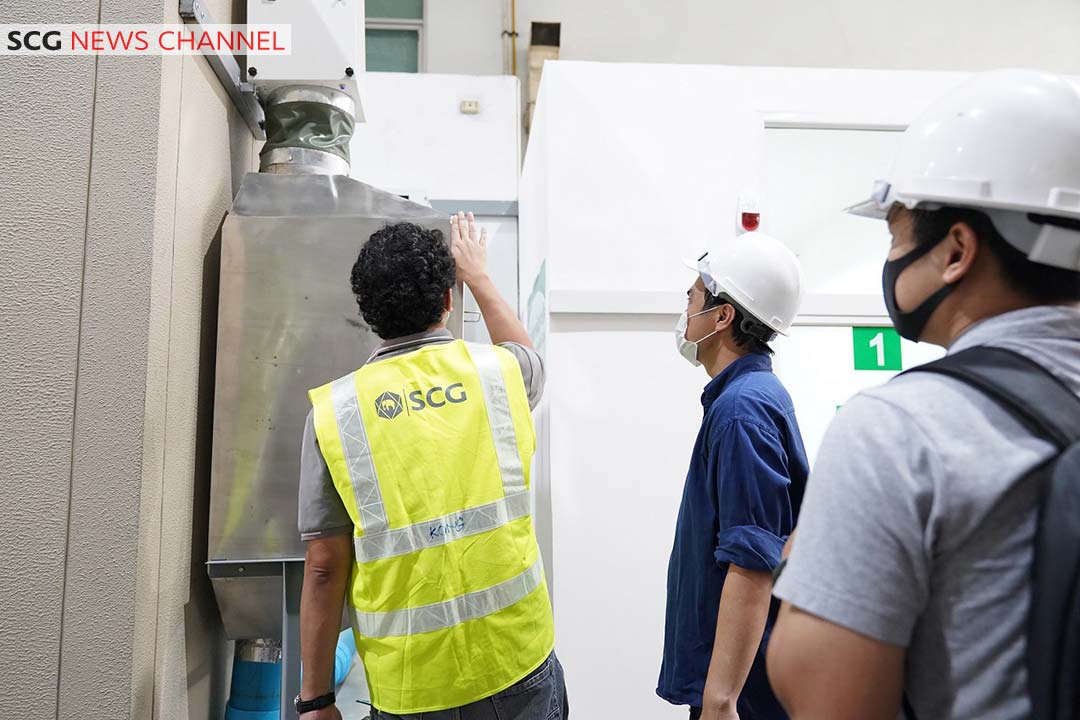
The benevolence of His Majesty the King and Her Majesty the Queen is like a beacon of light that guides and protects citizens during a time of severe crisis so that the country can overcome this difficult situation with the innovative “modular swab unit” which is an important tool that can help control and prevent the spread of the virus. The kindness of their majesties is also an inspiration for all thinkers and scientists in Thailand to develop innovation using Thai wisdom which can elevate the public healthcare sector in Thailand to become recognized among international communities. The glory of their majesties and the cooperation of Thai people are the powerful factors that will help the country declare victory in the fight against the COVID–19 virus in the near future.